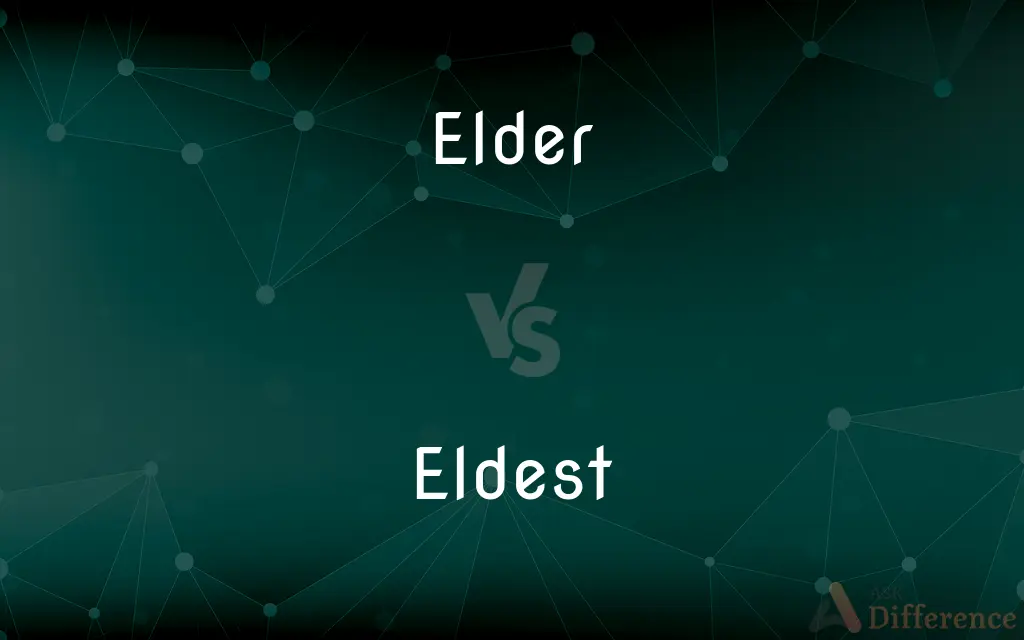Elder vs. Eldest — What's the Difference?
Edited by Tayyaba Rehman — By Maham Liaqat — Updated on April 5, 2024
"Elder" describes someone older within a group or family, often used generally, while "eldest" specifically denotes the oldest person or sibling in a family.

Difference Between Elder and Eldest
Table of Contents
ADVERTISEMENT
Key Differences
Elder is a term that can refer to a person who is older than another in a comparative context, often used in both family settings and to describe someone older in a community or society. On the other hand, eldest is used exclusively to identify the oldest member within a specific group, such as the oldest sibling in a family, emphasizing a singular position rather than a comparative status.
Elder can be used more broadly than eldest, applying to things beyond familial relationships, such as traditions, cities, or institutions, to denote something that is older or has been in existence longer. Whereas, eldest is strictly used for comparing ages within a defined group of people, often siblings, highlighting a more precise and limited application.
In terms of usage, elder may appear in more formal or literary contexts, often seen in phrases like "my elder brother" or "elders of the community," indicating respect or authority due to age. Eldest, however, is typically used in more specific contexts to clarify familial hierarchy, such as "my eldest sister," underscoring a factual relationship rather than a qualitative assessment.
While elder can be applied in plural form to denote a group of older individuals within a community, signifying respect or authority (e.g., village elders), eldest does not have a plural application, as it refers to only one individual in a specific context of age superiority within a family or group.
The distinction also extends to their usage as nouns and adjectives. Elder can function as both, often serving as a noun when referring to senior figures or as an adjective in comparative relations. Eldest, predominantly used as an adjective, rarely serves as a noun unless it is in the context of identifying the oldest sibling or family member.
ADVERTISEMENT
Comparison Chart
Definition
Older than another, in a general or comparative sense.
The oldest person within a specific group, especially a family.
Usage
Broad, can refer to people, traditions, cities, etc.
Specific, used exclusively for comparing ages within a group.
Context
Both formal and informal, signifies respect or authority.
More specific and factual, usually in familial hierarchy.
Plurality
Can be used in plural form (e.g., village elders).
Singular, refers to one individual.
Function
Serves as both noun and adjective.
Primarily used as an adjective, rarely as a noun.
Compare with Definitions
Elder
Used broadly to describe seniority or precedence.
In our culture, elder members are given the utmost respect.
Eldest
Indicates a singular, specific position of age.
The eldest member of the club was honored at the ceremony.
Elder
Older than another, especially within a family or community.
She sought advice from her elder sister.
Eldest
Refers to the oldest sibling within a family.
As the eldest, I always felt responsible for my brothers.
Elder
Functions as both a noun and an adjective.
As the elder statesman, he had a wealth of political experience.
Eldest
Primarily used as an adjective in familial contexts.
My eldest aunt has the most fascinating stories.
Elder
Can refer to ancient or older traditions.
The elder customs of our ancestors are still observed today.
Eldest
Rarely serves as a noun except in specific contexts.
The title of the eldest is accompanied by certain privileges.
Elder
A person of greater age, often respected or holding authority.
The village elders gathered to discuss the festival.
Eldest
Used to specify the oldest individual in a group.
He introduced his eldest child to us.
Elder
(of one or more out of a group of associated people) of a greater age
The elder of the two sons
My elder daughter
Eldest
Eldest is the second novel in the Inheritance Cycle by Christopher Paolini and the sequel to Eragon. Eldest was first published in hardcover on August 23, 2005, and was released in paperback in September 2006.
Elder
People who are older than one
Schoolchildren were no less fascinated than their elders
Eldest
(of one out of a group of related or otherwise associated people) of the greatest age; oldest
Swift left the company to his eldest son, Charles
Elder
A leader or senior figure in a tribe or other group
A council of village elders
Eldest
Greatest in age or seniority. See Usage Note at elder1.
Elder
A small tree or shrub with pithy stems, white flowers, and bluish-black or red berries.
Eldest
; greatest in age or seniority.
Eldest son
Elder
Greater than another in age or seniority.
Eldest
(card games) (of a player) Receiving cards from the dealer first, before any other players.
Elder
(Archaic) Superior to another or others, as in rank.
Eldest
(card games) (of a hand) Having higher, or superior cards.
Elder
An older person.
Eldest
The eldest child in a family, or individual in a group.
Elder
An older, influential member of a family, tribe, or community.
Eldest
Oldest; longest in duration.
Elder
One of the governing officers of a church, often having pastoral or teaching functions.
Eldest
Born or living first, or before the others, as a son, daughter, brother, etc.; first in origin. See Elder.
Their eldest historians are of suspected credit.
Elder
Mormon Church A member of the higher order of priesthood.
Eldest
The offspring who came first in the order of birth
Elder
See elderberry.
Eldest
First in order of birth;
The firstborn child
Elder
Inflection of old: older, greater than another in age or seniority.
The elder of the two was also an elder statesman
Elder
An older person or an older member, usually a leader, of some community.
We were presented to the village elder.
Elder
One who is older than another.
Respect your elders.
Elder
One who lived at an earlier period; a predecessor.
Elder
An officer of a church, sometimes having teaching responsibilities.
Elder
A clergyman authorized to administer all the sacraments.
A travelling elder
Elder
One ordained to the lowest office in the Melchizedek priesthood.
After being a member of the Church for a while, Bill was ordained to the office of elder.
Jack had been an elder for only a few days when he received a new calling.
Elder
Male missionary.
The elders are coming over for dinner tonight.
Elder
Title for a male missionary; title for a general authority.
One of the long-time leaders in the Church is Elder Packer.
Elder
(Germanic paganism) A pagan or Heathen priest or priestess.
Elder
A small tree, Sambucus nigra, having white flowers in a cluster, and edible purple berries
Elder
Any of the other species of the genus Sambucus: small trees, shrubs or herbaceous perennials with red, purple, or white/yellow berries (some of which are poisonous).
Elder
A cow's udder, especially used as food.
Elder
(Quakerism) To admonish or reprove for improper conduct by the elders of the meeting.
I was eldered for directly responding to someone else's message in meeting for worship.
Elder
Older; more aged, or existing longer.
Let the elder men among us emulate their own earlier deeds.
Elder
Born before another; prior in years; senior; earlier; older; as, his elder brother died in infancy; - opposed to younger, and now commonly applied to a son, daughter, child, brother, etc.
The elder shall serve the younger.
But ask of elder days, earth's vernal hour.
Elder
One who is older; a superior in age; a senior.
Elder
An aged person; one who lived at an earlier period; a predecessor.
Carry your head as your elders have done.
Elder
A person who, on account of his age, occupies the office of ruler or judge; hence, a person occupying any office appropriate to such as have the experience and dignity which age confers; as, the elders of Israel; the elders of the synagogue; the elders in the apostolic church.
Elder
A clergyman authorized to administer all the sacraments; as, a traveling elder.
Elder
A genus of shrubs (Sambucus) having broad umbels of white flowers, and small black or red berries.
Elder
A person who is older than you are
Elder
Any of numerous shrubs or small trees of temperate and subtropical northern hemisphere having white flowers and berrylike fruit
Elder
Any of various church officers
Elder
Used of the older of two persons of the same name especially used to distinguish a father from his son;
Bill Adams, Sr.
Elder
Older brother or sister;
Big sister
Common Curiosities
Can "elder" and "eldest" be used interchangeably?
No, "elder" is used in a comparative sense for someone older, while "eldest" specifically identifies the oldest person in a group.
Is "elder" only used for people?
No, "elder" can also describe things like traditions or cities that are older compared to others.
How is "eldest" used in a sentence?
"Eldest" is used to specifically mention the oldest sibling or family member, e.g., "My eldest brother is a pilot."
Does "eldest" have a plural form?
No, "eldest" refers to the single oldest individual in a group and does not have a plural form.
How does the role of "elders" in a community differ from the "eldest" sibling in a family?
"Elders" typically hold respect or authority in a community due to age or wisdom, whereas "eldest" refers specifically to the age order among siblings.
Can "elder" be used as a noun?
Yes, "elder" can function as a noun, referring to a respected older person or authority figure in a community.
Is it correct to refer to the oldest city as the "eldest"?
No, "eldest" is specifically for people within a familial or group context. "Elder" is more appropriate for cities, institutions, or non-human entities.
Can "elder" imply authority?
Yes, "elder" can imply a position of respect or authority, especially in cultural or community contexts.
Is "elder" respectful or derogatory?
"Elder" is generally used in a respectful context, acknowledging someone's greater age or wisdom.
How do "elder" and "eldest" relate to age hierarchy?
"Elder" can denote anyone older in a comparative sense, while "eldest" strictly identifies the topmost person in an age hierarchy within a group.
Share Your Discovery

Previous Comparison
Affinity vs. Avidity
Next Comparison
Gorilla vs. GuerrillaAuthor Spotlight
Written by
Maham LiaqatEdited by
Tayyaba RehmanTayyaba Rehman is a distinguished writer, currently serving as a primary contributor to askdifference.com. As a researcher in semantics and etymology, Tayyaba's passion for the complexity of languages and their distinctions has found a perfect home on the platform. Tayyaba delves into the intricacies of language, distinguishing between commonly confused words and phrases, thereby providing clarity for readers worldwide.
















































